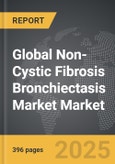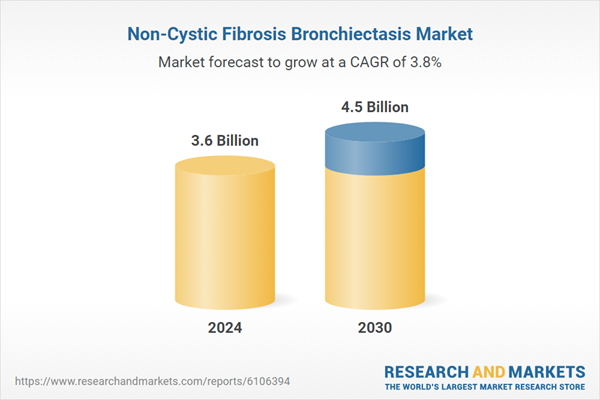Global Non Cystic Fibrosis Bronchiectasis Market - Key Trends & Drivers Summarized
How Is Disease Awareness Driving Clinical Recognition?
Non cystic fibrosis bronchiectasis is a chronic respiratory condition marked by irreversible airway dilation, frequent infections, and persistent sputum production. It often goes undiagnosed due to overlapping symptoms with COPD, asthma, or recurrent respiratory infections. Recent improvements in diagnostic imaging, particularly high-resolution CT scans, have led to better recognition of bronchiectasis as a distinct condition. As awareness grows among pulmonologists and general practitioners, more cases are being identified and accurately managed.Continuing medical education and updated clinical guidelines have played a pivotal role in raising awareness. Physicians are now more likely to consider bronchiectasis in patients with recurrent respiratory symptoms. Patient education campaigns and respiratory societies are also encouraging individuals with chronic cough and sputum to seek evaluation, further supporting earlier detection of the disease.
What Treatment Innovations Are Emerging in Disease Management?
Treatment for non cystic fibrosis bronchiectasis traditionally focuses on airway clearance techniques, antibiotics, and managing exacerbations. However, several novel therapeutic approaches are evolving. Inhaled macrolides and long acting antibiotics are being refined to minimize systemic exposure while improving airway microbiome management. Additionally, mucoactive agents and hyperosmolar saline formulations are being tailored for more effective mucus clearance.Research into targeted anti inflammatory therapies and biologics designed to modulate neutrophil pathways is also underway. These treatments aim to reduce chronic inflammation without compromising host defense. Furthermore, new non invasive ventilation and airway clearance devices are emerging, providing personalized respiratory support and improving patient quality of life. Supportive programs, such as supervised exercise and pulmonary rehabilitation, are being integrated into treatment regimens to reduce exacerbation frequency and promote lung function.
Why Are Patient-Centric and Multidisciplinary Care Models on the Rise?
Effective management of non cystic fibrosis bronchiectasis requires a comprehensive, patient centric approach. Multidisciplinary teams - including pulmonologists, physiotherapists, infectious disease specialists, and nutritionists - are becoming standard in respiratory clinics and care centers. These teams coordinate airway clearance plans, antibiotic regimens, nutritional counseling, and comorbidity management to optimize outcomes.Digital care tools have also enhanced patient support. Mobile apps help track symptoms, medication adherence, and physiotherapy routines. Telehealth consultations and remote monitoring enable timely intervention during exacerbations, reducing hospital readmissions. Patient support communities and disease registries are further strengthening treatment continuity and real world data collection efforts.
Growth in the non cystic fibrosis bronchiectasis market is driven by several factors.
Rising clinical awareness and improved diagnostic imaging are expanding detection rates and broadening patient pools. Development of targeted inhaled antibiotics, anti inflammatory agents, and mucus clearing therapies is enhancing treatment options. Integration of multidisciplinary care models and digital health platforms is improving management effectiveness and patient engagement. Additionally, clinical trials evaluating novel biologics and airway support devices are fueling pipeline activity. Greater emphasis on chronic respiratory disease management by public health systems continues to support investment in bronchiectasis care infrastructure and therapies.Report Scope
The report analyzes the Non-Cystic Fibrosis Bronchiectasis market, presented in terms of market value (US$). The analysis covers the key segments and geographic regions outlined below:- Segments: Treatment (Surgery Treatment, Physiotherapy Treatment, Vaccination Treatment, Airway Pharmacotherapy Treatment, Antibiotics Treatment, Other Treatments); Diagnosis (CT Scan Diagnosis, Bronchoscopy Diagnosis, Chest X-Ray Diagnosis, Lung Function Diagnosis, Sputum Culture Test Diagnosis, Blood Tests Diagnosis, Other Diagnosis Types); End-Use (Hospitals & Clinics End-Use, Ambulatory Surgery Centers End-Use, Other End-Uses).
- Geographic Regions/Countries: World; United States; Canada; Japan; China; Europe (France; Germany; Italy; United Kingdom; Spain; Russia; and Rest of Europe); Asia-Pacific (Australia; India; South Korea; and Rest of Asia-Pacific); Latin America (Argentina; Brazil; Mexico; and Rest of Latin America); Middle East (Iran; Israel; Saudi Arabia; United Arab Emirates; and Rest of Middle East); and Africa.
Key Insights:
- Market Growth: Understand the significant growth trajectory of the Surgery Treatment segment, which is expected to reach US$1.3 Billion by 2030 with a CAGR of a 5.2%. The Physiotherapy Treatment segment is also set to grow at 2.3% CAGR over the analysis period.
- Regional Analysis: Gain insights into the U.S. market, valued at $979.7 Million in 2024, and China, forecasted to grow at an impressive 7.3% CAGR to reach $920.9 Million by 2030. Discover growth trends in other key regions, including Japan, Canada, Germany, and the Asia-Pacific.
Why You Should Buy This Report:
- Detailed Market Analysis: Access a thorough analysis of the Global Non-Cystic Fibrosis Bronchiectasis Market, covering all major geographic regions and market segments.
- Competitive Insights: Get an overview of the competitive landscape, including the market presence of major players across different geographies.
- Future Trends and Drivers: Understand the key trends and drivers shaping the future of the Global Non-Cystic Fibrosis Bronchiectasis Market.
- Actionable Insights: Benefit from actionable insights that can help you identify new revenue opportunities and make strategic business decisions.
Key Questions Answered:
- How is the Global Non-Cystic Fibrosis Bronchiectasis Market expected to evolve by 2030?
- What are the main drivers and restraints affecting the market?
- Which market segments will grow the most over the forecast period?
- How will market shares for different regions and segments change by 2030?
- Who are the leading players in the market, and what are their prospects?
Report Features:
- Comprehensive Market Data: Independent analysis of annual sales and market forecasts in US$ Million from 2024 to 2030.
- In-Depth Regional Analysis: Detailed insights into key markets, including the U.S., China, Japan, Canada, Europe, Asia-Pacific, Latin America, Middle East, and Africa.
- Company Profiles: Coverage of players such as Allscripts (Veradigm), Athenahealth, Cerner Corporation, Change Healthcare, CompuGroup Medical (CGM) and more.
- Complimentary Updates: Receive free report updates for one year to keep you informed of the latest market developments.
Some of the 42 companies featured in this Non-Cystic Fibrosis Bronchiectasis market report include:
- Armata Pharmaceuticals
- AstraZeneca plc
- Boehringer Ingelheim
- Chiesi Farmaceutici S.p.A.
- CSL Behring
- GlaxoSmithKline plc
- Haisco Pharmaceutical Group
- Infex Therapeutics
- Insmed Incorporated
- NovaBiotics
- Novartis AG
- Parion Sciences Inc.
- Pfizer Inc.
- Regeneron Pharmaceuticals
- Renovion Inc.
- Sanofi S.A.
- SolAeroMed Inc.
- Teva Pharmaceutical Industries
- Verona Pharma plc
- Zambon S.p.A.
This edition integrates the latest global trade and economic shifts into comprehensive market analysis. Key updates include:
- Tariff and Trade Impact: Insights into global tariff negotiations across 180+ countries, with analysis of supply chain turbulence, sourcing disruptions, and geographic realignment. Special focus on 2025 as a pivotal year for trade tensions, including updated perspectives on the Trump-era tariffs.
- Adjusted Forecasts and Analytics: Revised global and regional market forecasts through 2030, incorporating tariff effects, economic uncertainty, and structural changes in globalization. Includes historical analysis from 2015 to 2023.
- Strategic Market Dynamics: Evaluation of revised market prospects, regional outlooks, and key economic indicators such as population and urbanization trends.
- Innovation & Technology Trends: Latest developments in product and process innovation, emerging technologies, and key industry drivers shaping the competitive landscape.
- Competitive Intelligence: Updated global market share estimates for 2025, competitive positioning of major players (Strong/Active/Niche/Trivial), and refined focus on leading global brands and core players.
- Expert Insight & Commentary: Strategic analysis from economists, trade experts, and domain specialists to contextualize market shifts and identify emerging opportunities.
Table of Contents
Companies Mentioned (Partial List)
A selection of companies mentioned in this report includes, but is not limited to:
- Armata Pharmaceuticals
- AstraZeneca plc
- Boehringer Ingelheim
- Chiesi Farmaceutici S.p.A.
- CSL Behring
- GlaxoSmithKline plc
- Haisco Pharmaceutical Group
- Infex Therapeutics
- Insmed Incorporated
- NovaBiotics
- Novartis AG
- Parion Sciences Inc.
- Pfizer Inc.
- Regeneron Pharmaceuticals
- Renovion Inc.
- Sanofi S.A.
- SolAeroMed Inc.
- Teva Pharmaceutical Industries
- Verona Pharma plc
- Zambon S.p.A.
Table Information
| Report Attribute | Details |
|---|---|
| No. of Pages | 396 |
| Published | February 2026 |
| Forecast Period | 2024 - 2030 |
| Estimated Market Value ( USD | $ 3.6 Billion |
| Forecasted Market Value ( USD | $ 4.5 Billion |
| Compound Annual Growth Rate | 3.8% |
| Regions Covered | Global |









